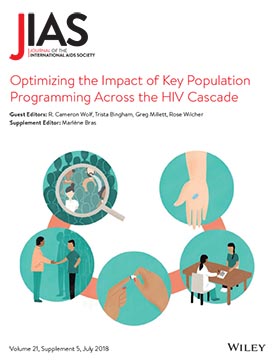A version of this post originally appeared on the LINKAGES blog. Reprinted with permission.
 The USAID– and PEPFAR-supported LINKAGES project is excited to announce the arrival of a new supplement in the Journal of the International AIDS Society (JIAS) titled Optimizing the Impact of Key Population Programming Across the HIV Cascade.
The USAID– and PEPFAR-supported LINKAGES project is excited to announce the arrival of a new supplement in the Journal of the International AIDS Society (JIAS) titled Optimizing the Impact of Key Population Programming Across the HIV Cascade.
A collaboration among LINKAGES, USAID, CDC, amfAR, and JIAS, this supplement contributes new evidence and data-driven strategies for improving programming with men who have sex with men, sex workers, transgender people and people who inject drugs. It contains 14 original articles that represent a range of multidisciplinary efforts from diverse geographies to advance key population science and practice across the HIV prevention, care and treatment cascade.
As HIV services are scaled up in pursuit of 90-90-90 targets, investments to address the epidemic among key populations must be central to these efforts. Global data indicate that gains made among key populations lag substantially behind those made in the general population. This supplement aims to accelerate progress toward controlling the epidemic by bringing visibility to new evidence and approaches that can make key population programming smarter and more effective.
The topics covered in the supplement articles include:
- Data collection methods and analyses specific to key populations that can be used to refine and focus interventions and services at different points along the cascade
- Strategies for improving the reach of prevention services, the uptake of HIV counseling and testing, and case finding among previously unreached key population members
- Innovations in HIV testing modalities and links to treatment
- Outcomes of community-led key population programming at scale
- Approaches to addressing structural barriers, including stigma and violence, in order to achieve better HIV-related outcomes for key populations
Achieving epidemic control will not be possible without more robust and rapid progress in delivering evidence-based interventions that improve key populations’ access to and uptake of HIV services across the cascade. Our hope is that this supplement will compel funders, policymakers, implementers and other stakeholders to do more now to champion, invest in and expand implementation of data-driven key population programming.
